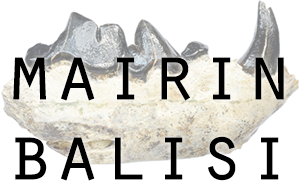Our paper / my first dissertation chapter is published today in Royal Society Open Science! Open-access = no paywall, so everyone can read it.
Here we asked if large-bodied animal species are more successful than small-bodied animal species, or if a mostly-meat diet or a plant-based diet or neither makes a difference in how long a species would last. Among North American fossil dogs of the past 40 million years, we found that large species tend to have shorter durations than small species, but the relationship between species duration and diet is not as straightforward. Dogs with more specialized diets at opposite ends of the spectrum, like those that consume very little meat (hypocarnivores) and those that consume mostly meat (hypercarnivores), tend to have shorter durations than middling species (mesocarnivores). At least for dog species, a generalized diet appears linked to success.
The fantastic illustration above by Mauricio Anton demonstrates the breadth of body size and diet in North American fossil dogs--we no longer have this diversity today! Drawn to scale: one of the smallest and earliest dogs, Archaeocyon leptodus, which went extinct ~20 million years ago; and the largest and possibly most carnivorous dog, Epicyon haydeni, which disappeared ~6 million years ago and was about the size of a grizzly bear.

